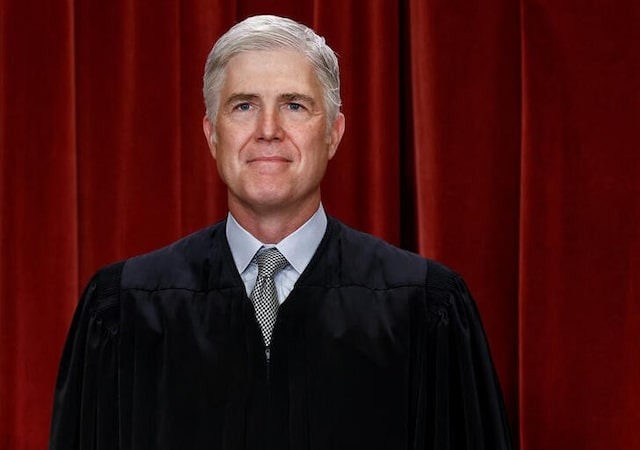In a compelling dissent that has reignited a longstanding legal debate, Supreme Court Justice Neil Gorsuch has advocated reinstating the traditional 12-person jury, a practice deeply rooted in Anglo-American jurisprudence.
This call comes in the context of the case of Natoya Cunningham, a Florida woman whose conviction by a six-person jury has sparked controversy and concern.
Cunningham, sentenced to eight years for aggravated battery and retaliation against an informant, found her fate decided by a significantly smaller jury than the conventional dozen, raising questions about the fairness and thoroughness of her trial’s deliberative process.
Gorsuch’s critique targets the 1970 Supreme Court decision in Williams v. Florida, which upheld the constitutionality of six-member juries, diverging from historical norms.
By referencing this case in his dissent, Gorsuch challenges the precedent and highlights its potential inconsistencies with the original understanding of the Sixth Amendment.
His stance underscores a broader judicial and scholarly concern that smaller juries might compromise the quality of deliberation and the representativeness that larger juries typically afford, thus affecting the integrity of the judicial process in the United States.
Case Spotlight: Natoya Cunningham
Natoya Cunningham’s legal ordeal has become a focal point in the national debate over jury sizes. Sentenced to eight years for aggravated battery and retaliation against an informant who had dealings with her nephew, Cunningham’s case was adjudicated by a six-person jury in Florida.
This more miniature jury composition, permissible under the laws of only six states, including Arizona, Connecticut, Florida, Indiana, Massachusetts, and Utah, has brought significant attention to the implications of such configurations on the justice system.
Cunningham’s conviction raises pivotal concerns regarding the effectiveness and fairness of smaller juries.
Critics argue that six-person panels may not provide a decision-making body as diverse and comprehensive as the traditional 12-member jury, potentially impacting the jury’s ability to consider multiple perspectives and reach a consensus that reflects broader societal values. This situation not only questions the adequacy of representation within smaller juries but also scrutinizes whether such configurations can truly deliver impartial justice. As a result, Cunningham’s case highlights her plight. It serves as a critical example in the ongoing discourse about how the size of a jury can influence legal outcomes and the fundamental principles of fairness and equality in the American legal system.
The focal point of Gorsuch’s argument is the 1970 Supreme Court ruling in Williams v. Florida, which stated that the Sixth Amendment does not necessitate 12-member juries, allowing states the discretion to implement smaller juries.
Gorsuch labeled this ruling an “embarrassing mistake” and argued that it contradicts the original intentions of the U.S. Constitution. He criticized the reliance on outdated studies in the Williams decision, which suggested that six-member juries could deliberate as effectively as larger ones.
Gorsuch expressed his discontent: “If we do not presently shoulder the burden of correcting our own mistake, they have the power to do so.” He urged the states that allow smaller juries to reconsider their laws, emphasizing that the American people, as much as the Supreme Court, are guardians of the Constitution.
Judicial Interest and Potential Shifts
Justices Brett Kavanaugh and Neil Gorsuch have recently underscored their interest in revisiting the longstanding debate on the adequacy of jury sizes, signaling a potential pivotal shift in the judicial approach to this fundamental aspect of the American legal system.
Their involvement highlights a growing judicial reconsideration of whether the smaller juries allowed in some states are as capable of delivering impartial and effective justice as the traditional 12-person panels that have been a cornerstone of the legal process for centuries.
This judicial scrutiny stems from concerns over the dynamics of smaller juries, particularly whether their reduced numbers impact the diversity of thought and stability of verdicts—key elements that larger juries are believed to enhance through broader representation and more robust deliberation.
Kavanaugh and Gorsuch’s attention to this matter suggests an openness to reevaluating precedents like Williams v. Florida, which permitted six-member juries.
Their questioning points to a broader judicial rethinking that might influence future rulings. States could potentially re-adopt the 12-person standard to strengthen the justice system’s integrity and public trust in its outcomes.
This potential shift could significantly affect legal strategies, courtroom procedures, and the public’s perception of fairness in the judicial process.
Legal Representations and Implications
The case of Cunningham v. Florida has thus become a critical vehicle for discussing these constitutional implications. Represented by Seth Waxman of Wilmer Cutler Pickering Hale and Dorr, Cunningham’s case challenges the status quo, prompting a reevaluation of how justice is administered in smaller juries.
Meanwhile, the state of Florida, represented by Henry Whitaker of the Florida Office of the Attorney General, defends the current practice, highlighting the legal complexities and varied opinions surrounding this issue.
As the Supreme Court moves forward, the debate over the size of juries remains a pivotal issue in American jurisprudence. Gorsuch’s dissent challenges existing legal norms and calls for a legislative review to align more closely with what he considers the Constitution’s true essence.
This ongoing dialogue underscores the dynamic nature of legal interpretations and the ever-evolving landscape of American law, where past precedents can be questioned to refine the justice system.










